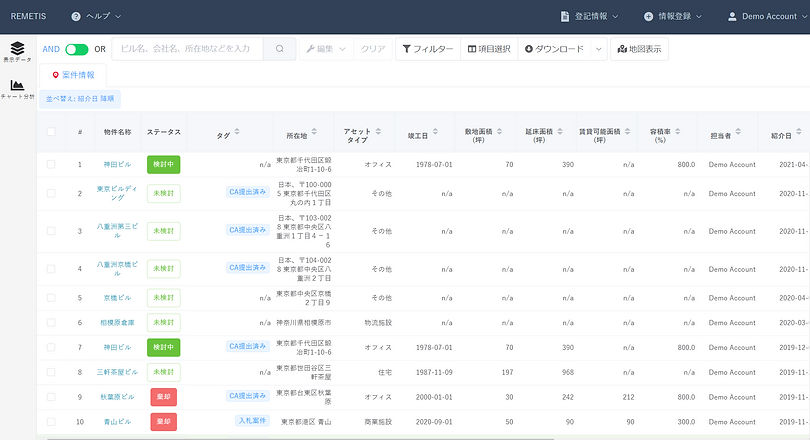Achieving the first steps of DX
to discover new business opportunities
Misawa Home Co., Ltd.

A major house builder, Misawa Homes are involved in a comprehensive range of businesses, including custom-built single-family homes, houses for sale, rental housing, remodeling, condominiums, and community development including medical, nursing care, and childcare facilities. They continue to design an affluent society driven by their wealth of experience, technology and bold pioneering spirit.
Manager,Real Estate Investment Section
Development Design & Engineering Section,Development Division
Mr. Masashi Hashimoto
(left)
Real Estate Investment Section, Development Division
Mr. Daisuke Kihara
(right)
Since its founding in 1967, Misawa Homes has been a pioneer in the housing industry, developing world-first and industry-first technologies, including zero-energy homes. Leveraging the know-how accumulated over many years in the detached housing business, the company is also actively promoting the development of rental housing, medical and nursing care facilities, childcare facilities, commercial facilities, and other businesses that create homes and communities that are close to people and their lives. Misawa Homes has introduced REMETIS in the Real Estate Investment Section of the Development Division. The team is accelerating its efforts to increase earnings by optimizing proposals with REMETIS as the core tool for DX. In this interview, we invited two people who played a major role in the implementation of REMETIS to talk about the DX effects of REMETIS.
Problem
・The cumbersome property registration process using Excel we used was increasing our workload and hindering productivity.
・Business opportunities were being lost due to the lack of timely and accurate information sharing, as well as the omission of property information.
Solution
・Reduce property registration time by 80~90%.
・All team members can share the acquired property information in a timely manner.
・All team members are able to share detailed property information to enable highly accurate property discussions.
・Improved quality of communication with brokers.
What business issues did you have before introducing REMETIS?
Kihara
In the past, we used Excel for property management and it was very time consuming to input as well as utilize the information. In addition to basic information such as the person in charge, acquisition date and time, and the company that provided the information, there were a wide variety of items to be entered, including asset type, area, cap rate, and rent for each property. Because of the time and effort required, some staff members did not want to enter the information. In addition, there were many cases where the necessary information could not be shared in a timely manner because of omissions in the input, resulting in cases where deals were missed or buried.
Hashimoto
However, if we tried to organize the properties accurately and in detail, we would have to spend more time on that, which would have limited the number of projects we could consider.
Kihara
Certainly, due to time constraints, it was difficult to examine properties in depth. In terms of information sharing, specific projects were shared at weekly meetings, but it was up to the person in charge to decide which projects to bring up at the meeting, so there was a situation where we did not know about projects that were not brought up at the meeting, such as properties that each person was currently considering.

How did you come to consider introducing REMETIS?
Hashimoto
The fact that REMETIS is a tool that allows us to visualize our business processes was more appealing to me than the fact that it reduces the amount of work required to input information, of course. I thought it was revolutionary that with just one entry, past property information is accumulated in chronological order, and the status of property collection by person and area, as well as the current market conditions, can be seen at a glance.
Kihara
The data and digitalization of property management will not only dramatically simplify what used to be a complicated process, but will also facilitate the sharing of in-depth information among the people in charge. Furthermore, from the administrator's point of view, there were expectations that the efficiency of property management would be greatly enhanced, and we were eager to introduce the system.

What were the benefits of actually implementing REMETIS?
Kihara
As a first-hand experience, I feel that property registration has become about 80% to 90% easier. Whereas before, we had to enter a variety of information for each property, from address to lot size, in Excel, with REMETIS all we had to do was enter the title and upload the summary, and by 9:00 AM the next day, all the information was filled in. I think we have made dramatic progress in terms of information sharing because we can instantly visualize who is getting what kind of property information.
Hashimoto
Accumulated information can be exported to Excel, and maps of each property can be quickly cut out on a print screen, making it easier to intuitively visualize what kind of property it is and share it with the entire team, which is another area of progress.
Kihara
It is certainly very nice to have the map and cap rates linked together. If we can immediately see which properties are yielding how much, it greatly improves the accuracy of our property considerations and makes it easier to approach higher quality information. I personally think that unit rent prices and cap rates are similar to big data, and with REMETIS, I can grasp in real time what kind of numbers the market rates are already moving at, and I can talk with the broker's staff with some knowledge of the market.
Hashimoto
It certainly has the effect of improving the quality of business negotiations. In our case, we need to carefully examine the acquisition and sale of properties, including risk management. However, the data presented by brokerage firms is often bland and insufficient to make the right decisions. With REMETIS, however, we can register a single property and instantly see what information is available to the public. Even if the brokerage firms provide information similar to the data we have obtained from REMETIS, we will not be satisfied. The brokerage firms will then make an effort to obtain more in-depth information. I expect that with REMETIS between the two parties, it will become possible to catch up on essential information.

Could you tell us about the response to DX conversion using REMETIS and your future expectations for REMETIS?
Hashimoto
Unlike IT, DX is ultimately about changing lifestyles through changes in work styles. From the perspective of our business, we believe there is a strong affinity between our work in urban development and DX. We have experienced this with REMETIS. This will change the density of work, increase leisure time, and significantly change the work environment itself. We have just taken the first step toward DX in our team, but we hope to expand REMETIS to the real estate-related sections of our group companies in the future so that it can be used across the board. Currently, even highly valuable information is confined to a single department and we would like to improve this situation in the next step. While we call this a cross-departmentalization of information, I expect that it will trigger the awareness of highly sensitive employees, since information that had been gentrified will be shared completely beyond the departmental boundaries. I feel that there will be more chances to create new business opportunities, such as using projects that we passed up in the past for other proposals.

Kihara
REMETIS was originally established by a real estate expert, so it is very easy to use. We are house builders, so in the end it is important to know how much value we can add to the space we have created. In the future, I would be happy to see an upgrade that links the architectural approach to the numbers.
Hashimoto
It could also be used for rental management. Instead of manually inputting data for each of the millions of properties we manage, we can simply upload a PDF file. In our industry, the condominium department only collects land for condominiums, the detached house sales department only collects land for detached houses for sale, and the real estate investment department only collects investment properties. I think one of the reasons for this is the deep-rooted mindset of not wanting to share information with others as much as possible.